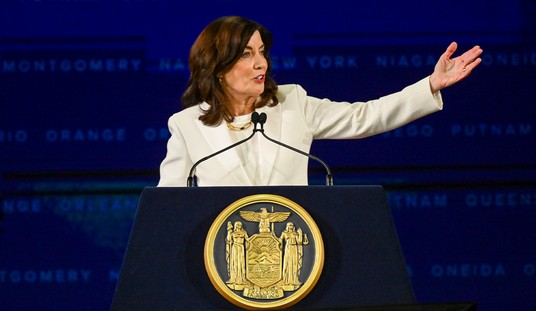America has a crisis of empathy.
That crisis isn't expressed as lack of charitable giving: Americans give approximately seven times what Europeans do to charity per capita. And it isn't expressed as an unwillingness to spend on a governmental level: The United States currently spends more money than any nation in the history of the world.
The crisis of empathy isn't even about an inability to walk in other people's shoes: America is one of the most racially and religiously tolerant nations on earth.
The American crisis of empathy rests in a simple fact: America is now divided over two mutually exclusive definitions of empathy. That divide is unbridgeable, and it's tearing the country down the middle.
One group of Americans — call them Neutrality-Driven Empaths — defines empathy as treating people as individuals capable of free choice and deserving of equality under the law. In this view, empathy manifests in respect for the capacity of other human beings, and in understanding that they make different decisions than you would. This version of empathy doesn't require that we agree with anyone's decisions, but that we understand that it is not our job, absent significant externalities, to rule them.
The other group of Americans — call them Emotion-Centered Empaths — believes that empathy means mirroring solidarity with subjective feelings in policy. In this view, empathy means expressing agreement with someone else's specific feelings, refusing to assess whether those feelings are merited or justified and then shaping policy around assuaging those feelings.
Neutrality-Driven Empaths believe that politics ought to be about solutions geared toward equality of individuals before the law. Policy and emotional empathy may come into conflict in this view. Emotion-Centered Empaths believe the opposite: They believe that politics ought to be about emotional solidarity rather than finding solutions. Policy must follow emotional empathy in this view.
Recommended
To take a rather stark example, consider the question of black student test performance. Neutrality-Driven Empaths will suggest that meritocratic standards are in fact the only neutral rules that can be applied to education, and that such standards have acted as a ladder for a wide variety of human beings of various races; that if a disproportionate number of black students underperform on such tests, that may merit empathy, but it doesn't merit discarding the standards. Emotion-Centered Empaths will, in direct opposition, suggest that the mere fact of black student underperformance (SET ITAL) requires (END ITAL) discarding testing regimes -- to do otherwise would be to abandon solidarity with those who underperform, to ignore the myriad factors that undoubtedly led to the underperformance in the first place.
The battle between Neutrality-Driven Empaths and Emotion-Driven Empaths creates a massive political asymmetry. That's because Neutrality-Driven Empaths acknowledge that while people may disagree over policy, that does not mean they are uncaring or cruel. But for Emotion-Driven Empaths, the opposite is again true: If policy is directly correlated with empathy, failure to agree represents emotional brutality and cruelty. Not only that: There can be no agreeing to disagree, because to suggest that people bear consequences for their actions is in and of itself uncaring and un-empathetic. It lacks solidarity.
The empathy gap is a crisis. If you believe that empathy means treating people as individuals capable of reasoning and acting under neutral rules, we can have a society. If you believe that empathy means shaping policy around solidarity with subjective feelings, rules become kaleidoscopic, variable and fluid — and compulsion is generally necessary in order to effectuate such rules.
Empathy for people as full human beings means recognizing their agency, understanding their differences and holding fast to equality before the law. If we reject those principles in favor of a high-handed and paternalistic approach to power politics, freedom will not survive.
Ben Shapiro, 37, is a graduate of UCLA and Harvard Law School, host of "The Ben Shapiro Show," and editor-in-chief of DailyWire.com. He is the author of the New York Times bestsellers "How To Destroy America In Three Easy Steps," "The Right Side Of History," and "Bullies." To find out more about Ben Shapiro and read features by other Creators Syndicate writers and cartoonists, visit the Creators Syndicate website at www.creators.com.
COPYRIGHT 2021 CREATORS.COM
























Join the conversation as a VIP Member